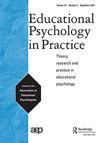Universal Design for Learning as a theory of inclusive practice for use by educational psychologists
IF 1.4
Q4 PSYCHOLOGY, EDUCATIONAL
引用次数: 2
Abstract
ABSTRACT Educational psychologists seek to keep abreast of significant theoretical and practical developments within the field of inclusive education. This paper outlines and discusses Universal Design for Learning as a theory of inclusion, highly applicable for use by educational psychologists. The Universal Design for Learning (UDL) framework is introduced by exploring the contextual history of its development and explaining the three pillars of the framework; the ‘affective networks’, the ‘recognition networks’, and the ‘strategic networks’. Application of the UDL framework is demonstrated with classroom-based examples, drawing on existing research. A critical stance is taken towards understanding the current drawbacks of UDL, and direct links to educational psychology practice are made and critically reviewed considering these.作为教育心理学家使用的包容性实践理论的通用学习设计
教育心理学家试图跟上全纳教育领域的重要理论和实践发展。本文概述并讨论了学习通用设计作为一种高度适用于教育心理学家的包容理论。通用学习设计(UDL)框架是通过探索其发展的背景历史和解释框架的三大支柱来介绍的;“情感网络”、“认知网络”和“战略网络”。在现有研究的基础上,通过基于课堂的实例演示了UDL框架的应用。本文采取了一种批判的立场来理解UDL目前的缺点,并提出了与教育心理学实践的直接联系,并考虑到这些问题进行了批判性的审查。
本文章由计算机程序翻译,如有差异,请以英文原文为准。
求助全文
约1分钟内获得全文
求助全文

 求助内容:
求助内容: 应助结果提醒方式:
应助结果提醒方式:


